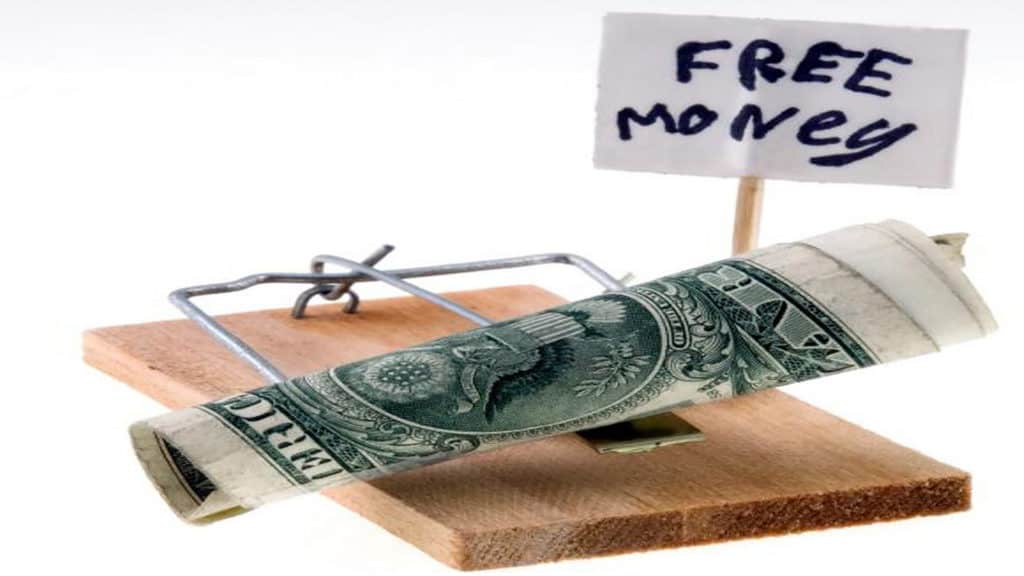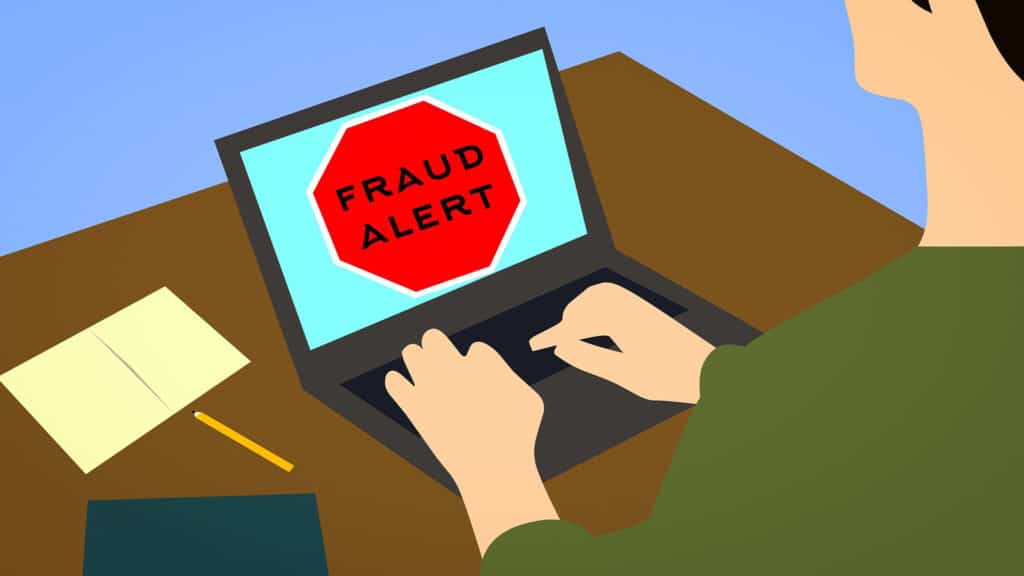In today’s world, it’s pretty easy to make money through affiliate marketing if you have a social media profile or website. What you may not know is that it’s just as easy for scammers to make money off of you when they pose as an affiliate marketing staple such as training or programs.
The best way to protect yourself and your affiliate marketing business from scams is to be aware of them and understand how to further look into them. If you want to stay in the know, keep reading to learn about the top affiliate marketing scams and a few tips on how to identify them.
Page Contents
What Is Affiliate Marketing and What Are Affiliate Marketing Scams?

If you’re new to the world of affiliate marketing then you may be asking yourself the above questions. We are here to make the breakdown easy so you understand what affiliate marketing is and how to protect yourself from scams.
To begin, affiliate marketing is when you market a product or service on your profile, website, or blog. When you post about this item you will also include your affiliate link.
This link will go directly to the item’s buy page and let the seller know that the sale was provoked by your marketing. After the customer makes a sale through your link you will receive a percentage or commission of the sale.
Since this is an e-commerce marketing job there are many ways scams can arise. Some affiliate marketing scams will try to get you to pay into them, others will try and offer you ways to get rich overnight. The reality of the situation is that if it seems too good to be true or doesn’t feel right, it’s most likely a scam.
Affiliate marketing scams are in place to appear like traditional affiliate marketing, but they end up taking your money instead of paying you. Below you will find the top scams and ways to prevent scammers from taking advantage of you and your business.
1. Fake Training
If you’re new to the work of affiliate marketing then you may want to take a few courses to learn the ropes. When doing a quick Google search for affiliate marketing training, you will be greeted with hundreds upon hundreds of results. Many of these results will be scams.
Many scammers make easy money by providing fake “how-to” or instruction courses online. These scams can be sold to you in the form of a book, ebook, online course, or a webinar.
The best way to avoid being scammed when signing up for a class or course is to do your research. Look at who is hosting the event or writing the book. Are they official?
Also, look at reviews on other websites for the course or book you’re interested in. Do these reviews say the product is legit, or do they sound scripted and fake?
If you end up buying the scam you will soon notice your mistake, because most of them are rip-offs and don’t actually teach you anything. If you buy a book you may receive one that is full of fluff and contains no actual information about making money through affiliate marketing.
Overall, make sure to do your research on what you’re about to buy. Don’t buy anything or take any courses from someone that doesn’t have a well-known name and a clean reputation.
2. Don’t Believe Those “Get Rich Quick” Offers

One of the biggest affiliate marketing scams you will come across is the “get rich quick” offer. These offers are lies and they are a majority of the reason that affiliate marketing can get a bad reputation.
These scams will promise that you will make thousands of dollars overnight or that you can work only a few days a week and make thousands. The truth of the matter is that no one can make money this fast just starting out, and you shouldn’t be naive and fall for it.
You should be aware of these scams and know that anyone who tries to sell you a quick rich plan isn’t legit. This is your first line of defense and your foolproof way of not falling into them.
Understand that with affiliate marketing, it takes some time to make a decent income. You have to build your following and join affiliate programs that give a decent commission. These things don’t just happen overnight, and the work you put into your profile or blog to gain followers will eventually pay off in the long run when you receive your first decent paycheck.
3. If There Is Nothing to Sell, Don’t Become an Affiliate
We all know that affiliate marketers make their money by promoting products and services on their profiles, websites, and blogs. If a company approaches you and offers you an unrealistic amount of money, such as thousands upon thousands of dollars, you should take time to pause and do a bit more research. This is especially true if you’re just getting started in the affiliate business.
Look to see what the company or website approaching you is selling. If it’s not clear on their website, then the truth is that it’s a scam.
These scams, often called “opportunities” when they approach marketers, are nothing more than a pyramid scheme. They are designed the same way and no one makes any real money off of them. You may even need to make an investment to join the program, only to realize there is no payoff and money is just being passed around from person to person.
Not to mention that pyramid schemes are illegal and you will lose any investment you’ve made into the scheme if it comes crashing down. In addition, your followers may not find you to be reputable anymore, killing your reputation.
The best way to avoid a scheme like this is to do your research. If a company approaches you asking to promote their products and you’ve never heard of it before, look into them and their business model.
See what their website looks like. If it’s fishy or something seems off, trust your gut and don’t agree to partner with them. Also, look into reviews and what others have to say, as you may find that someone has fallen for the scam and is warning people against it.
4. Domain Name Scams

A few years ago domain name scams were pretty popular and making their rounds. This scam worked by targeting people who owned an internet domain, including affiliate bloggers, and no one was safe.
The person that owned the targeted domain would receive an email that often came from China. This email would inform you that someone was trying to register the same domain you owned in China. They would make this email look like a courtesy, emailing you to make sure your ‘copyright’ was protected.
If you fell for this phishing email, then they would tell you that since you owned the domain first you would get preference. The catch was that you would have to register your domain with the China outlet. After this, you would receive a price list indicating how much money they would make off of you by making you purchase this extra domain.
The telltale sign of a phishing scam is when a scammer tries to get your information and then charge you for a “service”. If you receive an email stating something is wrong with your domain, head straight to your domain’s host and contact them. Don’t give anyone information or money through email or if they call you.
The best way to protect yourself from this scam is to be aware. Know that most reputable places won’t contact you unless it’s an emergency. Even if it is, you should call them back directly to protect yourself and your information.
Top Tips for Avoiding Affiliate Marketing Scams

Even though you’re now aware of the top affiliate marketing scams out there, this doesn’t mean that more won’t pop up or that there aren’t more already in action. To help you better protect yourself, we have compiled a few tips that will help you stay safe from any scam you may come across.
1. Ask Google

The best way to find out if something is legitimate or reputable is to Google it. If the scam has fooled someone before, it’s on the rise, or it’s well known, you will find information and advisories against the scam. Be sure to read up on everything that you can find including blog posts, reviews, and even news outlets that have reported on the issue.
2. Look Closely at the Company Website
If you’re not finding too much information on Google about your potential affiliate marketing scam, then head on over to the product or service’s website. If someone has reached out to you they should have linked their site or given you a brand name.
When looking at their site you should be on the lookout to make sure it’s legit. If the website doesn’t look professional, has spelling mistakes, or even a lot of layout mistakes, then it is most likely a scam. Make sure to check out the “about” and “contact” pages as well—if you can’t identify a real person or business entity, it could be a cover-up.
It’s good to point out that those who offer legit and real affiliate marketing opportunities keep their websites highly professional. So, if you’re unsure if the website is real, go and compare it to an affiliate marketing website you know is authentic.
3. Commission Percentage Should Be Genuine

If you’re new to affiliate marketing and are unsure of how you will make money, it’s pretty simple. For every click on your link that leads to a purchase, you will receive a percentage or commission for the sale. Commission rates that they differ from company to company, which means they can be a telltale sign of whether a company is legitimate or not.
If a company is offering an extremely high commission rate, then chances are the company isn’t legit. With this being said, it’s not impossible to find some companies that offer generous commission rates—but these are few and far between.
Again, the best way to make sure a company is a scam or a legit partner is to do your research. You should quickly find reviews on the company and whether their advertised commission rate is to be believed.
Now You Know What to Watch For
Affiliate marketing is a great way to make some cash from your website or social media profile. The only downsides are the affiliate marketing scams out there asking for your money or making you believe that you’ll receive a higher commission. To protect yourself against these, watch out for these top scams and remember these three tips to help protect yourself.
For more affiliate marketing tips and tricks, be sure to check out the rest of our website and download our free ebook today.

